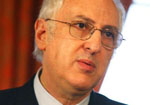 Guardian: The MEK was put on the terrorist list solely because the mullahs insisted on such action if there was to be any dialogue between Washington and Tehran.
Guardian: The MEK was put on the terrorist list solely because the mullahs insisted on such action if there was to be any dialogue between Washington and Tehran.
The Guardian – Comments
Claims that Iran’s opposition group MEK is irrelevant are belied by how keen the country’s leaders were to suppress it
By Alex Carlile
 Some people never give up spreading false information, no matter how clear it is that they are wrong.
Some people never give up spreading false information, no matter how clear it is that they are wrong.
Only hours after the US state department removed the People’s Mujahedin of Iran (PMOI/MEK) from its list of terrorist organisations (after 18 rulings in favour of the MEK delisting by the US, EU and UK courts), some at that agency went to great pains to assert that the organisation really isn’t that important and has little political influence within Iran.
It’s mind-boggling how little such individuals know about what is happening in Iran. Let’s look at the facts:
The MEK was put on the terrorist list solely because the mullahs insisted on such action if there was to be any dialogue between Washington and Tehran. This was all part of a misguided effort to reach out to “moderates” in the regime, an effort that accomplished nothing but gave Iran the time it needed to commence and advance its nuclear development.
So why would the regime want the opposition group listed? Why did it condemn the delisting? Because the MEK is “inconsequential” within Iran? Of course not – but because it fears the MEK’s influence within the country.
WikiLeaks revealed that the MEK staying on the terror lists was a constant demand from Tehran to its western counterparts.
Why would the mullahs prevail on their newfound friends in Baghdad to oppress, harass, and murder MEK members living at Camp Ashraf, near the Iraq–Iran border? Because it is just a harmless “cult”? Of course not – but because it fears the MEK’s influence within Iran.
Why would the regime constantly assail the MEK as the instigator of countless demonstrations in Tehran and other Iranian cities, and imprison and execute any MEK activists and supporters, if it is so unimportant? Because it is just a ragtag bunch of dissidents? Of course not – but because it fears the MEK’s ability to rally Iranians in support of a free and democratic country. In reality the mullahs have executed 120,000 MEK supporters and activists over the years. The number in itself speaks volumes on the MEK’s popularity among Iranians.
I wonder how those at the state department who insist that Iranians don’t support the MEK could know that. Did they do interviews in the streets of Tehran? Did they take polls around the country? Did they question those who are even afraid to complain about food shortages how they feel about the MEK?
Again, of course not.
Their contention is either wishful thinking or planted in their minds by Tehran; it cannot be scientific since, given the dreadful and dictatorial nature of the mullahs’ regime, there is no way for independent, fair and objective polling.
In reality far too much attention has been paid to disinformation disseminated by Tehran and its lobbyists in an effort to make the western countries conclude that there is no viable opposition and no chance of change from within – leaving the west to choose between making concessions to Iran or going to war, both very unpleasant choices.
If the MEK is such an obscure, irrelevant force, why are the mullahs are so concerned that for years they have kept the issue of shackling the leading resistance force a major part of their negotiations with the international community?
The truth is – contrary to the opinion of the naysayers at the state department – that the National Council of Resistance of Iran (NCRI), of which the MEK is its biggest member organisation, is the leading Iranian resistance organisation and is poised to act now that the terrorist listing has been removed.
As the NCRI’s leader Maryam Rajavi said in a recent interview in Brussels: “What we are seeking is political recognition and political support … We have this opportunity to let the world and the governments know us through our own voice rather than the perspective of our enemies. So far, we have been denied that choice with the terrorism label.”
Rajavi had the right idea when she called for western governments to further tighten sanctions. And she dismissed fears that they would hurt the Iranian people – only those close to the regime, she said.
The Iranian resistance has long said that it doesn’t want troops or even weapons. It wants the right to fight for the hearts and minds of the Iranian people. The recent anti-government demonstrations in Tehran and other major cities once again proved that Iran is ripe for change.
And think what a regime change in Tehran would mean: no more threat of a nuclear-armed Iran. Instead, there would be a democratic state to oppose rather than support the Assad regime in Syria, and to give Iraq a chance to find the democracy that tens of thousands died for. Freed from the terrorism label, the Iranian resistance can accomplish that.
Lord Alex Carlile of Berriew QC is a deputy high court judge and practising barrister, and was the independent reviewer of terrorism legislation between 2001 and 2011


